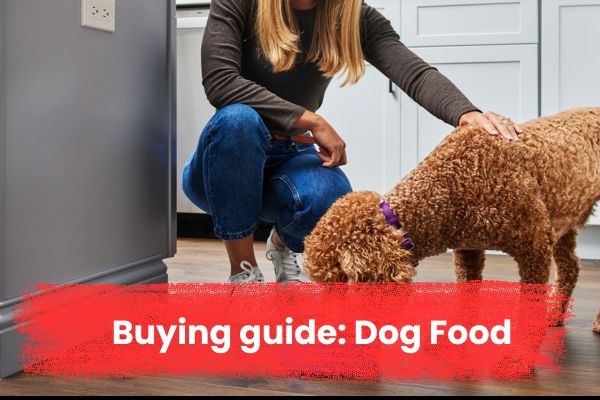Choosing the right dog food for your furry friend is crucial for their health and well-being. With a plethora of options available in the market, it can be overwhelming to decide which one is best for your dog. This guide will cover essential aspects such as nutrition, price, brands, calories, types, weight, taste, flavor, protein content, and size to help you make an informed decision.

Table of Contents
Nutrition: What is a Nutritious Diet for a Dog?
A nutritious diet for a dog should include a balanced mix of proteins, fats, carbohydrates, vitamins, and minerals. Here’s a breakdown of essential nutrients:
- Proteins: Essential for growth, muscle development, and tissue repair. Look for high-quality sources like chicken, beef, fish, and lamb.
- Fats: Provide energy and support skin and coat health. Sources include fish oil and flaxseed.
- Carbohydrates: Provide energy and aid digestion. Good sources are whole grains, vegetables, and fruits.
- Vitamins and Minerals: Essential for overall health and immune support. Ensure the food contains vitamins A, B, C, D, E, and K, as well as minerals like calcium, phosphorus, and zinc.
Price: How Much Does Dog Food Typically Cost?
Dog food prices vary based on the brand, quality, and type. Here’s an approximate cost range for different types of dog food:
| Type | Price (per pound) |
|---|---|
| Dry Dog Food | $1 to $3 |
| Wet Dog Food | $2 to $5 (per 13 oz can) |
| Premium Dog Food | $3 to $6 |
| Raw or Specialty | $5 to $10 |
Brand: What are the Top Five Dog Foods on the Market?
- Royal Canin: Known for its breed-specific formulas.
- Blue Buffalo: Offers high-quality, natural ingredients.
- Hill’s Science Diet: Veterinarian-recommended for its balanced nutrition.
- Wellness Core: Grain-free options with high protein content.
- Purina Pro Plan: Offers specialized nutrition for different life stages and health needs.
Calories: How Many Calories Do Dogs Need in a Day?
The number of calories a dog needs daily depends on its age, size, activity level, and metabolism. Here’s a general guideline:
| Dog Size | Daily Calorie Intake |
|---|---|
| Small Breeds (up to 20 lbs) | 200-400 calories |
| Medium Breeds (20-50 lbs) | 600-800 calories |
| Large Breeds (50-100 lbs) | 1,000-1,200 calories |
| Extra-Large Breeds (100+ lbs) | 1,200-2,000 calories |
Type: What are the Different Types of Dog Food?
- Dry Kibble: Convenient, affordable, and has a long shelf life.
- Wet Canned Food: High in moisture, good for hydration.
- Raw Food: Mimics a natural diet, often includes raw meat and bones.
- Freeze-Dried and Dehydrated: Preserved nutrients, just add water.
- Prescription Diets: Formulated for specific health conditions.
Weight: How Much Food Should a Dog Eat a Day by Weight?
The amount of food a dog should eat daily depends on its weight and activity level. Here’s a general guideline:
| Dog Size | Daily Food Intake (cups) |
|---|---|
| Small Dogs (up to 20 lbs) | 1/2 to 1 1/2 cups |
| Medium Dogs (20-50 lbs) | 1 3/4 to 2 3/4 cups |
| Large Dogs (50-100 lbs) | 3 to 4 1/2 cups |
| Extra-Large Dogs (100+ lbs) | 4 1/2 to 6 cups |
Taste: What is the Best Tasting Dog Food for a Dog?
Taste is subjective and varies from dog to dog. Some popular and palatable options include:
- Merrick Grain-Free Texas Beef & Sweet Potato
- Blue Buffalo Wilderness High Protein Grain-Free
- Taste of the Wild High Prairie Canine Recipe
- Nutro Ultra Grain-Free
- CANIDAE Grain-Free PURE
Flavor: What Flavor Do Most Dogs Like?
Dogs generally prefer flavors such as:
- Beef
- Chicken
- Lamb
- Salmon
- Turkey
These flavors are often more palatable and appealing to dogs due to their natural preferences.
Protein Content: How Much Protein Does a Dog Need a Day?
Protein requirements vary based on a dog’s age, size, and activity level. Generally:
- Puppies: 22-32% of daily caloric intake from protein
- Adult Dogs: 18-25% of daily caloric intake from protein
- Senior Dogs: 18-23% of daily caloric intake from protein
Size: How Much Dog Food Does a Dog Need Per Day?
The amount of dog food needed per day is usually specified on the food packaging and depends on the dog’s weight and activity level. Here is a general guideline:
| Dog Size | Daily Food Intake (cups) |
|---|---|
| Small Dogs (up to 20 lbs) | 1/2 to 1 1/2 cups |
| Medium Dogs (20-50 lbs) | 1 3/4 to 2 3/4 cups |
| Large Dogs (50-100 lbs) | 3 to 4 1/2 cups |
| Extra-Large Dogs (100+ lbs) | 4 1/2 to 6 cups |
Recommended Dog Foods in the United States
Here are some top-recommended dog foods available in the United States:
| Brand | Type | Price (per pound) |
|---|---|---|
| Royal Canin | Dry Kibble | $2 to $3 |
| Blue Buffalo | Grain-Free | $3 to $5 |
| Hill’s Science Diet | Prescription | $2 to $4 |
| Wellness Core | High Protein | $4 to $6 |
| Purina Pro Plan | Specialized Diet | $2 to $4 |
Conclusion
Choosing the right dog food involves considering various factors to ensure your pet gets the necessary nutrition for a healthy and active life. By understanding the nutritional needs, costs, and preferences, you can make an informed decision that benefits your dog’s overall well-being.